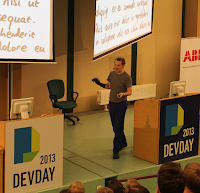I’ve recently visited DevDay 2013 at Krakow, Poland.
DevDay is a one-day long event, organized by ABB.
There were 12 speakers and around 300 participants.
Talks
Back to basics: the mess we’ve made of our fundamental data types
Jon Skeet
Jon focused on the things we all use everyday, perhaps, not paying to much attntion to the details. Numbers, strings, dates.
For example, in java,
double d = 0.3d is actually 0.299999999 Talk from ThoughtWorks generalising specialist, about what continious delivery really is and how does it help to move the business forward.
Talk from ThoughtWorks generalising specialist, about what continious delivery really is and how does it help to move the business forward.
So, as Patrick suggests, we should :
For example, in java,
double d = 0.3d is actually 0.299999999
Also, Jon pointed to interesting facts about dates. For example:
- CST is the name for 3 different timezones
- There are dates which exist in one country only – February 30, 1712
And finally “The Turkey Test“. If you want to test your application internationalization – just try to run it in Turkey.
It was a great key note from a great speaker, who is known for C# in depth and also, as the most popular user at StackOverflow.
Implementing continious delivery
Patrick Kua
Patrick Kua
 Talk from ThoughtWorks generalising specialist, about what continious delivery really is and how does it help to move the business forward.
Talk from ThoughtWorks generalising specialist, about what continious delivery really is and how does it help to move the business forward.So, as Patrick suggests, we should :
- Release often
- Make no breaking changes – this becomes easier if you release frequently, because each release becomes a minor change.
- Make Ops and Dev teams work together
Moving the web to the client
Hadi Hariri, JetBrains evangelsit, had a talk about front-end frameworks in genral and specifically about Angular JS.
He also reminded about the power of HTTP protocol, whch is often undertaken by the developers. The suggestion is to use HTTP not only as a transport protocol, but an application protocol, which it really is.
Full text search with Apache Lucene
Itamar Syn-Hershko
 The author of Raven DB in action explained the fundamentals of full text search and how Lucene helps to solve the problem.
The author of Raven DB in action explained the fundamentals of full text search and how Lucene helps to solve the problem.
He also recommended the ElasticSearch, which is build on top of Lucene and has clustering support out of the box. Apart from ability to scale to many servers, there’s also a REST API, which, looks to be easy to learn and use.
The Architecture of StackOverflow
Marco Cecconi
Software engineer from StackExchange, Marco Cecconi gave an overview of the infrastructure and architecture, which lies behind one of the most popluar web-sites in the world – StackOverflow.
Itamar Syn-Hershko
 The author of Raven DB in action explained the fundamentals of full text search and how Lucene helps to solve the problem.
The author of Raven DB in action explained the fundamentals of full text search and how Lucene helps to solve the problem.He also recommended the ElasticSearch, which is build on top of Lucene and has clustering support out of the box. Apart from ability to scale to many servers, there’s also a REST API, which, looks to be easy to learn and use.
- There are only 23 servers handling all the load – it is ~10 times less then sites with similar traffic usually have.
- Everything is cahced – database servers have ~300GB of RAM memory.
- At StackOverflow, they scale-up. When everyone is saying that applications should run on cheap comodity hardware, SO runs on big servers, without any cloud platforms.
- All the server are located in the US.
It was funny to see Marco on the next day, wearing T-shirt, with the following phrase written on it:
“I don’t usually test my code, but when I do – I do it in production”.
“I don’t usually test my code, but when I do – I do it in production”.
The software journeyman’s guide to being homeless and jobless
Rob Ashton
Rob Ashton
The closing talk from Rob Ashton was all about fun and motivation. An expiring story of a man, who left a boring job and decided to work for free, for companies who needed help.
Gadgets
Each participant recieved a nice package with high-quality T-shirt, pen and notebook.
Fun
But, at 10 pm we’ve moved to a pub, for an after-party, which ended at ~5 am in the morning.
Conlusion
DevDay 2013 was perfect.
Well organized, with interesting talks, nice venue and a lot of fun. And it was all free!
Well organized, with interesting talks, nice venue and a lot of fun. And it was all free!






